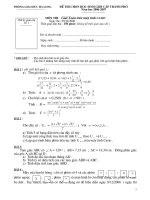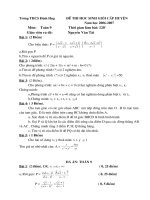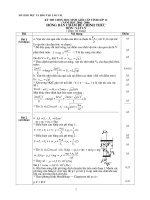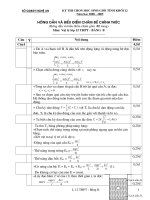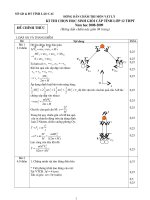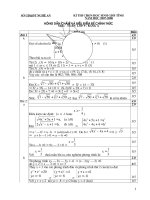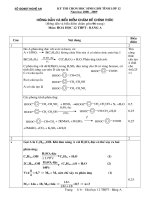De-Dap an HSG AV9 - Gialai(2010-2011)
Bạn đang xem bản rút gọn của tài liệu. Xem và tải ngay bản đầy đủ của tài liệu tại đây (372.21 KB, 7 trang )
SỞ GIÁO DỤC VÀ ĐÀO TẠO
GIA LAI
KỲ THI CHỌN HỌC SINH GIỎI TỈNH LỚP 9
NĂM HỌC 2010 – 2011
ĐỀ CHÍNH THỨC
Môn thi: TIẾNG ANH
Thời gian làm bài: 150 phút (không kể thời gian giao đề)
Ngày thi: 29/03/2011
Đề thi có 08 trang và th sinh làm bài trực tiếp trên đề thi này
* Thí sinh không được sử dụng tài liệu, kể cả từ điển.
* Giám thị không giải thích gì thêm.
Part One: Listening (10 phút)
Bài thi nghe gồm 3 phần. Mỗi phần được nghe 2 lần. Kết thúc mỗi phần nghe có tín hiệu nhac. Kết thúc bài
nghe, thí sinh có 30 giây để hoàn chỉnh bài làm. Thí sinh phải đọc kỹ yêu cầu bài làm (bằng tiếng Anh) trong
đề.
Listen and number each five- day forecast (1 pt)
a.
Monday Tuesday Wednesday Thursday Friday
b.
Monday Tuesday Wednesday Thursday Friday
c.
Monday Tuesday Wednesday Thursday Friday
d.
Monday Tuesday Wednesday Thursday Friday
e.
Monday Tuesday Wednesday Thursday Friday
Listen to people discussing their vacation plans. Check (
) all of the places they will visit (0.8pt)
1. Singapore 2. London 3. Los Angeles
Seoul Oxford San Francisco
Hong Kong Cambridge Denver
China France Dallas
Thailand Germany Washington, D.C
Tokyo Switzerland New York
Malaysia Italy Boston
Choose the best answer (A, B or C) for each of the following questions (1.2pt)
1. What’s the possible relationship between the speakers?
A. Friends. B. Former classmates and friends. C. Colleagues
2. When were they in college?
A. Twenty years ago. B. Twenty-five years ago. C. Thirty years ago.
3. What does Martin remember most about the college day?
A. Curtis’ hair down to his waist B. How Grace looked C. The air-conditioned blue jeans.
4. What is Grace’s best memory?
A. The time they were driving home from college for a spring break.
B. The peace demonstration
C. The graduation day.
5. Who of the three went to the graduation ceremony?
A. Martin B. Curtis C. None of them
6. How did Grace spend her graduation day?
A. She went for a picnic with Martin and Curtis
B. She attended the graduation ceremony.
C. She drank wine in bar.
Part Two: Phonetics
Choose the word whose underlined part is pronounced differently from that of the other words in each
group (0.5pt)
1. A. pronounce B. other C. won D. ton
2. A. guilty B. suitcase C. suitable D. recruit
3. A naked B. needed C. sacred D. served
4. A. headache B. flame C. shame D. shadow
5. A. coughs B. hopes C. thoughts D. ploughs
Choose the word whose stress is different from that of the other words in each group (0.5pt)
6. A. military B. accurate C. preferential D. delicate
7. A. human B. treatment C. miracle D. disease
8. A. occasion B. discover C. industry D. arrange
9. A. revolution B. independence C. associate D. operation
10. A. technology B. educational C. accessible D. miraculous
Part Three: Vocabulary and Grammar
Choose the correct word or phrase to complete each sentence (1.5pt)
1. The child was told to eat all his vegetables or he would get no ice-cream.
A. else B. instead C. in fact D. in case
2. His new appointment takes …………… from the beginning of next month.
A. place B. effect C. post D. possession
3. There was no in waiting longer than half an hour so we left.
A. good B. point C. worth D. use
4. I to other people borrowing my books: they always forget to return them.
A. disagree B. avoid C. dislike D. object
5. The discovery was a major for research workers
A. break-in B. break-out C. break-through D. break-down
6. …………… known as “Stonehenge” has never been determined.
A. That the stone circle B. The stone circle
C. There is the stone circle D. Who built the stone circle
7. I hope we will be able to avoid anyone
A. disappointment B disappointing C. disappointed D. disappoint
8. Ben was stopped by a police officer last night. He must …………… too fast.
A. drive B. be driving C. has driven D. have driven
9. I failed the physics exam because it was …………… difficult for me.
A. too B. such C. very D. very much
10. There were over 30,000 at the football match.
A. spectators B. viewers C. witnesses D. watchers
11. I suggest we outside the English speaking club tomorrow at 8.30
A. meeting B. meet C. met D. will meet
12. …………… next Sunday.
A. I would rather you had come B. I would rather you have come
C. I would rather you came D. should rather you came
13. The rise in house prices …………… him to sell his house for a large profit.
A. managed B. succeeded C. enabled D. achieved
14. I will show you around the city when you to visit me.
A. coming B. will be coming C. will come D. come
15. No sooner had he sat down to lunch there was a knock at the door.
A. as B. that C. when D. than
Part four: Error identification
In most lines of the text, there is one unnecessary word. It is either grammatically incorrect or does not fit
in with the sense of the test. Underline this word and write it in the gap or put a tick (
) if a line is correct. 0 and
00 are examples (1.5pt)
COMMUNICATION
Managers spend most of their time communicating-reading, and writing
talking or listening - yet the evidence is that they do not always do
this as successfully. One reason that has been suggested for this is that, in the
past, communication was regarded as a natural process, not been taught in any
formal sense. This theory has been changing, and with the concept of
communication as an “art” now appears regularly in the management courses
and seminars. Communication is probably only one of the least appreciated
aspects of management, and more and more organizations are realizing that
effective communication involves telling staff why all things are happening.
This not only helps day-to-day working but allows changes to be introduced
more smoothly, and sometimes leads to improvements for being mentioned
by staff. Both the morale and efficiency of an organization
are depend to a great extent on the abilities of its staff to communicate
effectively. Communication is not something that should be undertaken only
when trouble occurs. It should be a daily habit if the organization is to run
smoothly and avoid difficulties and, of course, it should be both a two-way
process, involving listening to as well as talking. Regular exchanges of ideas
between managers and staff will help to create good teamwork.
0 … and……
00 … …. …
1.
2.
3.
4.
5.
6.
7.
8.
9.
10.
11.
12.
13.
14.
15.
Part five: Word transformation
Read the text below. Use the word given in capitals at the end of each line to form a word that fits in the
space in the same line (1pt)
FIVE WAYS TO IMPROVE YOUR MEMORY
* Pay better attention at the time. Rehearse the information (1)
afterwards, allowing (2) longer gaps between each
(3) Thus, when you hear a name, say it to yourself, then say it again a
minute later, and so on.
* Tax your brain in a (4) of ways. One researcher found that
rats (5) interesting things to do had better memories than bored rats
* Attach meaning to memory - the more (6) an event is,
the better it will be remembered.
* Attach what you want to remember to something already familiar to you.
Let’s say you need to remember ten words; start by (7) things
that are well-known to you (8) , such as objects in your house,
then associate one of the words with each.
*Have (9) in your ability to remember things around you.
Don’t (10) your brain.
IMMEDIATE
INCREASE
REPEAT
VARY
GIVE
SIGNIFY
MEMORY
PERSON
CONFIDE
ESTIMATE
Part six: Reading
Read the passage and fill in each gap with ONE SUITABLE WORD (1.6 pt)
I live in a small village (1) Asuka- there are about 450 people there. I love it because it is
(2) and life is slow and easy. You never (3) to queue in shops or banks. The village is
(4) People (5) after it and never (6) rubbish in the streets. The air is pure because
there’s not much (7) traffic. It’s much more (8) here than in the city. Everyone knows each
other and if someone has (9) , there are always people who can help. There aren’t (10)
things I don’t like (11) Asuka. One thing is that there’s not (12) to do in the evening- we haven’t
got any (13) or theaters. (14) problem is that people always talk about every one and they almost
know (15) every one else is doing. (16) those facts, I still prefer village life to life in a big city.
Complete the letter by writing ONE SUITABLE VERB in each space. A contraction (don’t) counts as one
word (0.9pt)
Dear Tom,
Well, this time next week you’ll be somewhere in Europe on a train. I’m sure any mum would (17) !
Actually, you’re very lucky. I’d love to be able to go off around the world. I often wish I (18) traveled
more when I was younger. I really hope you (19) yourself, but do be careful, won’t you? You’re only 18
after all. Do take care with your money, won’t you? And I’d rather you (20) spend too many nights in
your tent alone. It’s so dangerous. I suggest you only (21) your tent in a proper campsite.
I wish you(22) going quite so soon. It’s a pity you (23) stay until after Dad’s 50
th
birthday. But never mind. I wish Dad (24) be at the airport to see you off, but he’s got some really
important business that day.
Suppose we (25) out to see you in June. Just a thought. Anyway, just remember, if you get into
any trouble, we’re only a phone call anyway, and come what may , we’ll always be there for you.
Love, Mum
Read the following passage and answer the questions that follow by circling A, B, C, D to indicate your
answer. ( 1 pt)
CONSERVING THE WORLD’S NATURAL RESOURCES
In the decade of the 1970s, the United Nations organized several important meeting on the human
environment to study a very serious problem. We humans are destroying the world around us. We are using up all of
our natural resources. We must learn to conserve them, or life will be very bad for our children and our grandchildren.
There are several major parts to this problem.
1. Population. Most problems of the environment come from population growth. In 1700 there were 1.6 billion,
in 1950 2.5 billion, and in 1980 4.4 billion. In the year 2000 there will be 6.3 billion. More people need more
water, more food, more wood, and more petroleum.
2. Distribution. Scientists say there is enough water in the world for everyone, but some countries have a lot of
water and some have only a little. Some areas get all their rain during one season. The rest of the year is dry.
There are huge forests in the Amazon area of Brazil. In other parts of the world there is only desert.
3. Petroleum. We are using up the world’s petroleum. We use it in our cars and to heat our building in winter.
Farmers use petrochemicals to make the soil rich. They use them to kill insects that eat plants. These chemicals
go into rivers and lakes and kill the fish there. Thousands of people also die from these chemicals every year.
Chemicals also go into the air and pollute it. Winds carry this polluted air to other countries and other continents.
4. Poverty. Poor farmers use the same land over and over. The land needs a rest so it will be better next year.
However, the farmers must have food this year. Poor people cut down trees for fire wood. In some areas, when the
trees are gone, the land become desert. However, people need wood to cook their food now. Poor people cannot save
the environment for the future.
We now have the information and the ability to solve these huge problems. However, this is not a problem for
one country or one area of the world. It is a problem for all humans. The people and the nations of the world must
work together to conserve the world’s resources. No one controls the future, but we can help make it.
26. We are using up all of our
A. oceans B. homes C. farms D. natural resources
27. Most environmental problems come from
A. forests B. population growth C. too much rain D. poor distribution
28. Good distribution means
A. having things in the right places at the right time B. cutting down forests and selling them to other countries
C. building water systems to carry water to farms D. conserving our natural resources.
29. Poor farmers don’t give their land a rest because
A. They don’t have petrochemicals to kill insects.
B. They don’t have enough land to let some of it rest each year.
C. They need more water.
D. They need firewood
30. Which one of these statements is not true ?
A. People must work together to save the environment B. We have the ability to solve environmental problems
C. We control the future. D We help make the future.
Part seven: Writing
Finish each of the following sentences in such a way that it means the same as the sentence printed before
it (1.5 pt)
1. Harry broke his leg, and also injured his shoulder.
Not only
2. I will bring some water because I am afraid that there is no water supply.
In case ……………………………………………………………………
3. But for the bad weather, it would have been a superb weekend.
If ……………………………………………………………………………………
4. You can take any of the routes; it will still take you about three hours to get there.
Whichever ………………………………………………………………………………
5. Scientists have tried very hard to find a cure for this disease.
Enormous effort ………………………………………………………………………
Finish each of the following sentences in such a way that it is as similar as possible in meaning to the original
sentence. Use the word given and other words as necessary. Do not change the form of the given word. (4 pts)
6. If you should hear anything, let me know. Should
7. 'You broke my camera!' Susan said to Richard. accused
Susan ………………………………………………………… her camera.
8. You're going too fast for me. keep
I ……………………………………………………………… ………….… you!
9. I don't know Watanabe's reasons for her resigning. idea
I ………………………………………………………………… Watanabe resigned.
10. Have you any desks in stock which are cheaper than this? desk
Is this ……………………………………………………………… … in stock?
11. If you found the missing money, what would you do? were
What would you do gone missing?
12. We have agreed to meet again in a fortnight. been
It has meet again in a fortnight.
13. Quite a few books are missing from the class library. returned
Several members library books.
14. About 100 people were waiting for the late bus. arrived
By about 100 people waiting.
15. Her car was the last car you’d expect to be stolen. very
Hers you’d expect to be stolen.
Composition: (3pts)
Some researches on how people live today state that life is much better today than it was in the past. Write a
composition to express your opinion.
Your composition should be about 200 words; you may compare the past and present living conditions,
means of transport, communication, entertainment; you can express your agreement or disagreement with the
statement.
…………………………………………………………………………………………………………………………
The end
SỞ GIÁO DỤC VÀ ĐÀO TẠO
GIA LAI
KỲ THI CHỌN HỌC SINH GIỎI TỈNH LỚP 9
NĂM HỌC 2010 – 2011
ĐÁP ÁN VÀ HƯỚNG DẪN CHẤM ĐỀ CHÍNH THỨC
(Đáp án này có 02 trang)
Part 1. LISTENING 3 points
1/ a2, b4, c1, d5, e3 0.2 x 5 = 1 p
2/ (0.8p) 8 correct words at least.
1. Singapore 2.London 3. Los Angeles
Seoul Oxford Denver
Hong Kong France Washington, DC
Thailand Switzerland New York
Italy
3/ 0.2 x 6 = 1.2 points
1.B. Former classmates and friends.
2. A. Twenty years ago.
3. A. Curtis’ hair down to his waist
4. B. The peace demonstration
5.C. None of them
6. A. She went for a picnic with Martin and Curtis
Part 2 PHONETICS 0.1 x 10 = 1 point
1. A pronounce 2. A guilty 3. D. served 4. D shadow 5. D ploughs
6. C preferential 7. D disease 8. C industry 9.C associate 10. B. educational
Part 3 Vocabulary and Grammar 0.1 x 15 = 1.5 points
1. A. else 2. B. effect 3. B. point 4. D. object 5. C. break-through
6. A. That the stone circle 7. B disappointing 8. D. have driven 9. A. too
10.A. spectators 11. B. meet 12. C. I would rather you came
13. C. enabled 14. D. come 15. D. than
Part 4 Error identification 0.1 x 15 = 1.5 points
1.as 2 been 3. with 4. the 5. only 6.
7. all , 8.
9. for 10.
11. are 12.
13.
14. both 15. to
Part 5 Word formation 0.1 x 10 = 1 point
1. IMMEDIATELY 2. INCREASINGLY 3. REPETITION
4.VARIETY 5. GIVEN 6. SIGNIFICANT
7. MEMORIZING 8. PERSONALLY 9. CONFIDENCE
10. UNDERESTIMATE
Part 6
READING (3.5 pts) 0.1 x 25 = 2.5 points – Sentences from 26-30 0.2 x 5 = 1 p
1. called 2. quiet/beautiful/peaceful 3. have 4. clean 5. look 6. throw
7. heavy 8. friendly 9. problem 10. many 11. about 12. much
13. cinemas 14. Another 15. what 16 Despite 17. worry 18. had 19 enjoy
20 didn’t 21 use/pitch 22. weren’t 23. cannot 24. could 25. come/came
Sentences from 26-30, 0.2 x 5 = 1 pt
26. D. natural resources
27. B. population growth
28. A. having things in the right places at the right time
29. B. They don’t have enough land to let some of it rest each year.
30. C. We control the future.
Part seven:
WRITING: (8.5 points)
1-5 x 0.3 = 1.5 pt, 5-15 x 0.4 = 4 pts Composition: 3 points
Finish each of the following sentences in such a way that it means the same as the sentence
printed before it. (5.5 points)
1. Not only did Harry break his leg but he also injured his shoulder.
2. In case there is no water supply, I (will) bring some water.
3. If the weather had been fine/ hadn’t been so bad, it would have been a superb weekend.
4. Whichever routes you take, it will still take you about three hours to get there.
5. Enormous effort has been made to find a cure for this disease.
6. Should you hear anything, let me know.
7. Susan accused Richard of having broken her camera.
8. I cannot keep up with you!
9. I have no idea why Watanabe has resigned./I don’t have any idea of Watanabe’s resignation.
10. Is this the cheapest desk you have in stock?
11. What would you do were you find the money which has gone missing?
12. It has been agreed that we will meet again in a fortnight.
13. Several members of the class have not returned their library books.
14. By the time the bus (finally) arrived, there were about 100 people waiting.
15. Hers was the very last car you’d expect to be stolen.
Composition (200 words) 3points
- Outline: Introduction – Body – Conclusion (0.5pt)
- Content: (either agree- life is better or disagree- life is worse ) (2.5pts)
• Living conditions: houses, food, clothes.
• Working conditions/ Means of transport.
• Entertainment / Communication.

